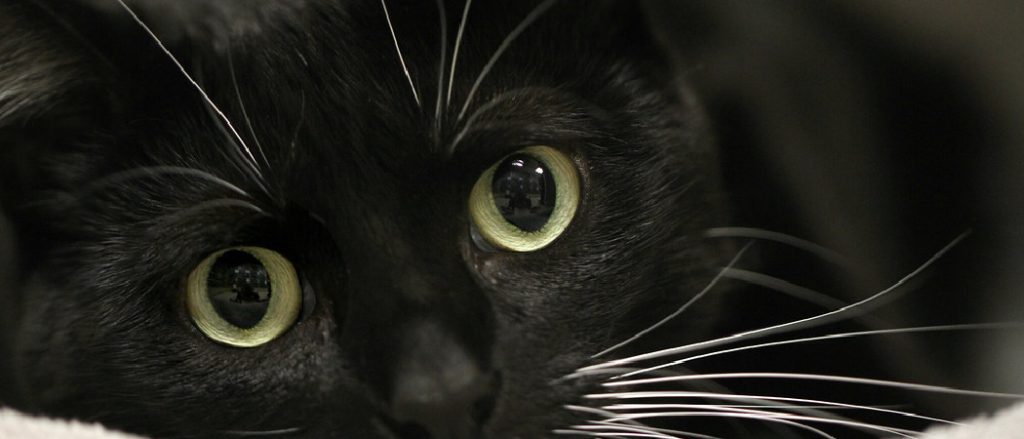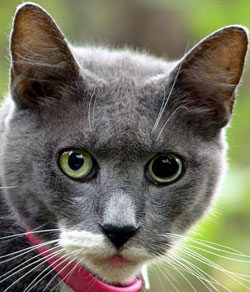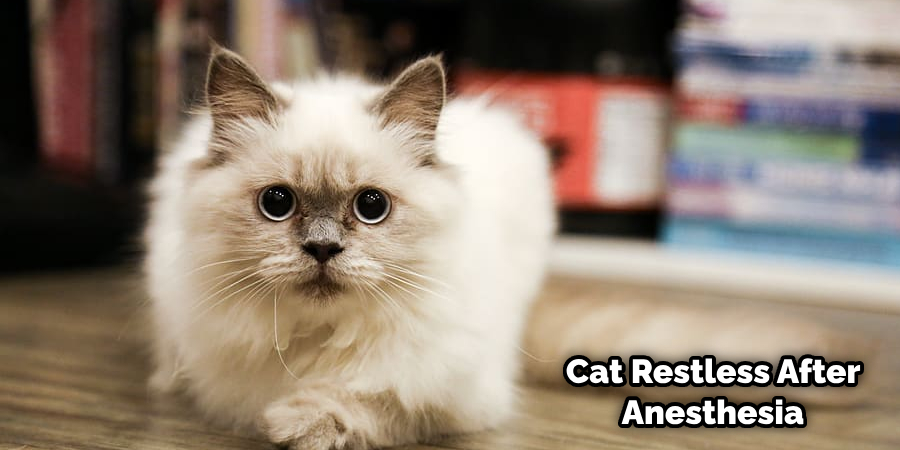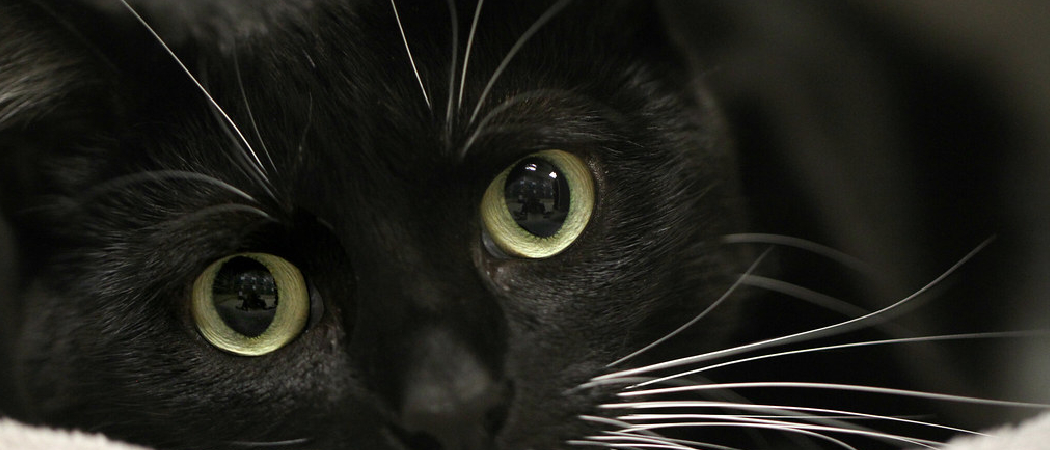After a cat has been anesthetized, their eyes may appear to be dilated. This is due to the relaxation of the muscles around the eye and is not cause for concern. The dilation should resolve within a few hours as the anesthesia wears off.

As a pet owner, it’s natural to worry about your furry friend when they have to go under anesthesia. One of the most common side effects of anesthesia is dilation of the pupils, which can be quite alarming to see in your cat’s eyes. However, there is no need to worry as this is perfectly normal and will resolve itself within a few hours. When your beloved feline friend undergoes anesthesia for surgery or a medical procedure, it’s natural to feel concerned about their well-being afterward. One common phenomenon that can raise questions and even alarm is the dilation of a cat’s pupils after anesthesia. While it may seem unsettling at first, understanding the reasons behind this occurrence can provide reassurance and help you take better care of your post-anesthesia kitty. In this informative blog post, we’ll explore why cat’s eyes dilate after anesthesia and what you can do to ensure a smooth recovery for your furry companion.
Just make sure to keep an eye on your kitty and give them plenty of love and cuddles until they are back to their usual selves! If you went to know more about cat eyes dilated after anaesthesia, keep reading!
How long does it take for dilated eyes to go back to normal?
Can Anesthesia Cause Eye Dilation?
There are a variety of types of anesthesia, and each type can have different effects on the body. One common side effect of anesthesia is dilation of the pupils. This occurs because the anesthesia affects the part of the brain that controls pupil size.
The dilated pupils can remain for a few hours after the surgery or procedure is over.
Why Do Cat’s Eyes Dilate After Anesthesia?
To understand why a cat’s eyes dilate after anesthesia, it’s essential to grasp the mechanics of anesthesia itself. Anesthesia involves the administration of drugs that induce unconsciousness, suppress pain, and relax muscles during surgery or medical procedures. While these drugs are crucial for the safety and comfort of your cat during the procedure, they can have various effects on the body, including the eyes.
- Medication Effects: Anesthetic drugs can directly affect the muscles controlling the size of the pupils. Some medications used in anesthesia, such as atropine, scopolamine, or opioids, can cause pupil dilation as a side effect. These drugs block the action of acetylcholine, a neurotransmitter responsible for constricting the pupil. When this inhibition occurs, the pupils enlarge, resulting in dilation.
- Stress Response: Cats can experience stress and anxiety before, during, and after anesthesia. The unfamiliar environment, strange smells, and the presence of strangers (veterinary staff) can trigger a stress response in your feline friend. As a part of the stress response, the cat’s body releases adrenaline, which can also cause pupil dilation. This dilation is a physiological response to prepare the body for the “fight or flight” reaction, even when the cat is unconscious.
- Low Light Environment: During surgery and post-anesthesia recovery, cats are often kept in dimly lit or darkened rooms. The reduced light levels can contribute to pupil dilation as a natural response to adjust to low light conditions. Cats have excellent night vision, and dilated pupils allow more light to enter the eyes, enhancing their ability to see in low-light environments.
Can Anesthesia Affect Cats Eyes?
Anesthesia can have different effects on different cats, and sometimes it can affect their eyes. The most common side effect is that the pupils become dilated and may not return to normal for several hours after the anesthesia has worn off. In some cases, however, anesthesia can cause more serious problems like blindness or damage to the retina.
If you’re concerned about your cat’s eyes during or after anesthesia, be sure to talk to your veterinarian about it.
Is Dilated Pupils After Anesthesia Normal?
Yes, dilated pupils after anesthesia are generally considered normal. As explained earlier, the dilation of a cat’s pupils can be attributed to the drugs used during anesthesia, the stress response, and the dimly lit environment during recovery. These factors combined can lead to the dilation of the pupils, and it’s usually nothing to be alarmed about. However, it’s essential to monitor your cat’s condition closely during the recovery process.
How Long Do Eyes Stay Dilated After Anesthesia?
It is common for eyes to stay dilated after anesthesia. The duration of the dilation can vary depending on the type of anesthesia used. For example, local anesthesia typically only causes dilation for a few hours while general anesthesia can cause dilation for up to 24 hours.
Can Medication Cause Dilated Pupils in Cats?
While it is not common, medication can cause dilated pupils in cats. There are a variety of medications that have been known to cause this side effect, including antihistamines, antidepressants, beta-blockers, and some forms of cancer chemotherapy. If your cat’s pupils suddenly become dilated and they are not in a situation where they would normally be exposed to bright light (such as being outdoors on a sunny day), it is worth considering medication as a possible cause.
If you are concerned that your cat’s medication may be causing its pupils to dilate, speak to your veterinarian for further advice.

Credit: vcahospitals.com
Cat Sedation After-Effects
Most cats experience mild after-effects from sedation. These may include drowsiness, incoordination, and disorientation. Most of these effects will wear off within a few hours, although some may last for up to 24 hours.
In rare cases, more serious side effects can occur.
Cat Behaviour After Sedation
As a pet owner, it’s important to be aware
Monitoring Your Cat After Anesthesia
While dilated pupils are often a benign and expected side effect of anesthesia, it’s crucial to keep an eye on your cat’s overall condition during the recovery period. Here are some key points to consider:
- Vital Signs: Ensure that your cat’s vital signs, such as heart rate, respiratory rate, and body temperature, are within the normal range. These signs can give you valuable insights into your cat’s overall well-being.
- Body Movements: Observe your cat’s movements and coordination. It may take some time for the effects of anesthesia to wear off completely, and your cat might be unsteady or disoriented initially.
- Hydration and Food: Encourage your cat to drink water and offer small amounts of easily digestible food once they are awake and alert. Proper hydration and nutrition are essential for a smooth recovery.
- Elimination: Monitor your cat’s litter box habits. Anesthesia can temporarily affect bladder and bowel function, so ensure your cat is urinating and defecating as usual.
- Contact Your Vet: If you notice any concerning symptoms or if your cat’s condition doesn’t improve as expected, don’t hesitate to contact your veterinarian. They can provide guidance and reassurance.
how your cat may behave after being sedated. Cats are naturally curious creatures and may be more active than usual when they first wake up from sedation. This is why it’s important to keep a close eye on them and make sure they’re not getting into any trouble.
Your cat may also be disoriented and confused after being sedated. They may not recognize you or their surroundings and may act differently than usual. It’s important to give them time to adjust and don’t force them to do anything they’re not comfortable with.
If you have any concerns about your cat’s behavior after sedation, please contact your veterinarian.
Cat Restless After Dental Surgery
After your cat has dental surgery, it may be restless and have a decreased appetite. This is normal and to be expected. Their mouth will be sore and they may not feel like eating.
Give them time to recover and make sure they have plenty of water available. They should start to feel better in a few days.
Complications and When to Be Concerned
While pupil dilation itself is generally not a cause for concern after anesthesia, there are some complications that you should be aware of:
- Uneven Pupil Size: If you notice that one pupil remains dilated while the other returns to normal size, this could indicate a neurological issue or injury. Contact your vet immediately if this occurs.
- Persistent Dilation: If your cat’s pupils remain dilated for an extended period, beyond 48 hours, it may warrant a check-up with your veterinarian to rule out any underlying issues.
- Other Abnormal Symptoms: If your cat exhibits other abnormal symptoms, such as seizures, excessive drooling, or difficulty breathing, seek immediate veterinary attention.
Cat Restless After Anesthesia

After your cat has undergone anesthesia, it is not unusual for them to be a bit restless. This is perfectly normal and nothing to be concerned about. Your cat may experience some drowsiness and disorientation after the anesthesia has worn off and this can last for up to 24 hours.
If your cat seems unusually agitated or distressed, please get in touch with your veterinarian.
Cat Restless After Anesthesia
After your cat has anesthesia, it’s normal for them to be a little restless. This is because the anesthesia can take a while to wear off and they may not be used to being in such a relaxed state. If your cat is restless after anesthesia, try to keep them calm and comfortable until the effects have worn off completely.
One Eye Dilated After Anesthesia
As most people are aware, when you go under anesthesia for a surgery or procedure, your pupils (the black part of your eye) will dilate (get larger). This is completely normal and happens to everyone. However, sometimes after the anesthesia has worn off, one pupil may remain dilated while the other returns to its normal size.
There are a few reasons why this may happen. First, it could be due to an imbalance in the medication used during anesthesia. Second, it’s possible that the nerve that controls the pupil on the affected side was damaged during the surgery.
And lastly, it could be simply because one eye takes longer to recover from anesthesia than the other. If you experience this symptom after anesthesia, it’s important to contact your doctor immediately so they can rule out any serious causes and determine whether or not you need further treatment. In most cases, however, there is no cause for concern and the problem should resolve itself within a few days.
Cat Third Eyelid After Anesthesia
As a pet owner, it’s important to be aware of the potential side effects of anesthesia on your cat. One common side effect is called “third eyelid prolapse.” This occurs when the third eyelid, which is normally not visible, prolapses and becomes visible after anesthesia.
This condition is usually not serious and will resolve itself within a few days. However, if you notice that your cat’s third eyelid does not return to its normal position within a few days, or if it appears to be causing your cat discomfort, please contact your veterinarian for further evaluation.
Cat Eye Dilated After Anesthesia
Anesthesia can cause cats’ eyes to dilate, but this is usually not a cause for concern. The dilation is usually temporary and will resolve on its own. However, if the dilation persists or is accompanied by other symptoms, it may be a sign of a more serious problem and you should consult your veterinarian.
Conclusion
After a cat undergoes anesthesia, their eyes may appear dilated. This is because the muscles that control pupil size are relaxed. The dilation usually goes away within a few hours, but it can take up to 24 hours for the pupils to return to normal size. In conclusion, dilated pupils in cats after anesthesia are a common and expected occurrence. It’s primarily a result of the drugs used during anesthesia, the stress response, and the low-light environment in which cats are often kept during recovery. While it can be unsettling to witness, understanding the reasons behind it can help alleviate concerns.
However, it’s crucial to be vigilant and monitor your cat’s overall condition during the recovery period. If you notice any unusual or concerning symptoms, don’t hesitate to contact your veterinarian. Your vet is your best resource for guidance and reassurance when it comes to your cat’s post-anesthesia care. Remember that every cat is unique, and their recovery from anesthesia may vary. Providing a calm and comfortable environment, along with proper hydration and nutrition, can go a long way in ensuring a smooth and uneventful recovery for your beloved feline companion.
If your cat’s eyes are still dilated after 24 hours, you should contact your veterinarian. Thanks for reading our blog post about cat eyes dilated after anaesthesia.

